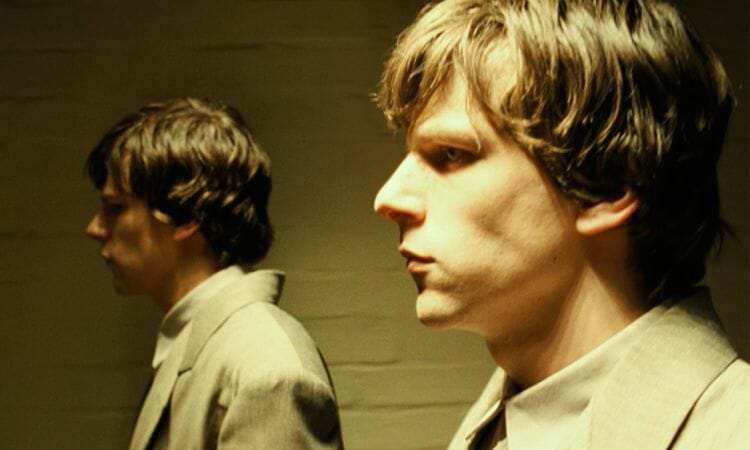By Michelle Donnelly · May 13, 2014


Simon is a man no one can remember. His boss, the guard at his work; his mother doesn’t even recognize him on television. He feels lonely and lost, and except for his obsessive longing for Hannah (Mia Wasikowska), his existence is drab and lifeless. While he concedes it’s of his own making, he feels powerless to change his situation. Enter James, Simon’s eerie double. Same hair, same face, same suit; their only apparent difference is their personality. James seems to be living Simon’s life, only better. James is the epitome of smooth and ably makes those around him do as he wishes. Like a puppet master, he manipulates people for his own pleasure. Soon, James has Hannah pining over him, possesses the keys to Simon’s apartment and unwittingly cons Simon into getting him a promotion at work. All this while Simon slips further away from controlling his own life.
Best known for his work as a comedic actor and director of music videos, Richard Ayoade’s masterful take on the Dostoevsky novella of the same name is worth the time. It’s a movie that at once intrigues us, disturbs us and visually satisfies us. It’s not your typical comedy, but its ironic humor is more pleasing than many a movie claiming to be so. Thanks to Erik Wilson, cinematography is key to this film. While Dostoevsky’s writing creates a colorful visual sense that engages his audience, Wilson’s sparse use of color reinforces the dullness that is Simon’s life. Stark blues often punctuate bleak grays and we are reminded that Simon’s life is only a vague series of events that preclude him from committing suicide. In addition to the visual aesthetic used in this film, the use of sound to jar the audience is unique and effective. At any certain time we are subjected to bumps, squeaks and hisses that make us feel as confused and helpless as Simon. Intriguingly, it’s a movie almost void of time. A futuristic television show, a Soviet style housing complex, a 50s style diner and a bosses’ gothic looking daughter, all create the illusion that this could happen anywhere to anybody.
Jesse Eisenberg’s portrayal as both Simon and his doppelganger, James, is superb. He manages to achieve a personality for both, such that there is no confusion over who is who. He’s aptly sociopathic as James, but easily converts to being vulnerable and powerless. Appearing in most every scene, he maintains an intense performance that never wavers. After a promising encounter with Hannah, Eisenberg deftly turns Simon into a confident, happy young man and yet he skillfully portrays it as different than James’s status quo. In the scene, he creates Simon’s confidence as a playful exuberance, a man who can’t believe his dreams are coming true. James’s confidence, on the other hand, is such that it believes the evil that lurks beneath, threatening to bubble up at any moment.
Actor Wallace Shawn plays Mr. Papadopoulous, Simon and James’s boss. Shawn, well known for his extensive stage, television and film work, excels as a frenetic and clueless civil servant. Like a hamster on a treadmill, his character continually works to encourage his hapless workforce. We briefly catch glimpses of Papadopoulous’s boss, The Colonel (James Fox), behind doors that the average worker never seems to go through called the Honor Room. The Colonel succinctly sums up Simon’s state when, in a television commercial, he proclaims of workers, “there is no such thing as special people, just people.”
The Double is a modernized tale of psychological intrigue. It is engaging and unexpectedly humorous. It’s unconventional, creative and the performances are top-notch. It’s a movie that causes us to question what we know about ourselves and how we perceive the world. It will make you think while it entertains you and in my book, that’s exactly what a film should do.